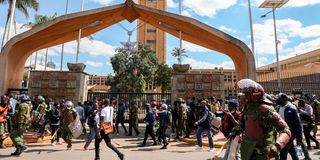
Police attempt to restrain demonstrators along Parliament Road in Nairobi on June 25, 2024.

The unprecedented and daring move by young protesters to storm Parliament on June 25, 2024 over the Finance Bill has fundamentally changed how the August House conducts its business.
From committee meetings and plenary sittings to how Parliament facilitates public participation in legislative proposals, the institution has not been the same since.
In an interview with the Nation, Clerk of the National Assembly Samuel Njoroge said things have significantly improved especially in how Parliament engages with the public.
He, however, admitted that the situation could have been avoided had Parliament adopted clear and effective communication, particularly concerning the budget cycle and the financing of the national budget.
“Our messaging on the specific contents of the Finance Bill and the fact that the House adopted the majority of views from public participation in the final version of the Bill passed by the National Assembly was not effective,” Mr. Njoroge said.

A joint sitting of the National Assembly and Senate.
He added that the events of June 25, 2024, do not reflect how Kenyans truly feel about Parliament.
“It would seem that various grievances coalesced on that particular day and placed a spotlight on the passage of only one piece of legislation. Misinformation, disinformation and consistent vilification of Parliament all played a part in the unfortunate events of that day,” he said.
According to the clerk, Parliament passes more than 30 pieces of legislation each year but in June 2024, attention was disproportionately focused on just one Bill already at the tail end of the budget cycle that begins in February.
“It would be an unfair assessment of the tremendous work that Parliament does to reduce it to the merits of one Bill and the events of a single day,” he said.
Opening up for the first time since the incident, Mr Njoroge said that in his more than 20 years of service in Parliament, he had never felt as low as he did on that day. “The events of that day mark one of the darkest days for all Kenyans. It was an unprecedented incident that lowered the esteem of the legislature as an arm of government and as a representation of the people’s will,” he said.
The official pointed out that the National Assembly has enhanced the ways in which the public can submit their views on Bills under consideration.
“The National Assembly has embraced innovation by going beyond traditional processes of submitting views. For instance the House has adopted the use of QR codes that can easily be accessed via mobile phones, allowing Kenyans to conveniently submit their views from the comfort of their homes,” he said.
“Whereas public participation has been brought closer to the people, the adoption of newer and more expansive modes has also increased the cost of the exercise. Despite the costs the National Assembly remains committed to ensuring that the views of as many Kenyans as possible are considered in parliamentary business.”

Furniture in the National Assembly's dinning hall that were vandalised by rioters who stormed Parliament Buildings on June 25, 2024.
Mr Njoroge said the House has now fully embraced Gen Zs and is working to communicate more effectively with them about parliamentary activities. “Gen Zs don’t exist in isolation. They are part of our society as they are in our families among our staff and we even have members who are Gen Z. These are people among us and we deal with them every day at different levels,” he said.
Mr Njoroge noted that during most committee deliberations and the vetting of individuals nominated by the President for various constitutional offices, members of the public are now allowed to send in live questions. These questions are then posed to the nominees by the committee chairperson.
Parliament’s social media platforms such as Twitter, Facebook and WhatsApp have become active forums through which the House engages with young people.
To reduce costs and ensure the prudent use of public resources, the National Assembly is also leveraging existing administrative structures, including constituency offices, to reach more people at the grassroots level on any legislative matter.
To help ordinary citizens understand complex Bills and make informed contributions, Mr Njoroge said the National Assembly has begun publishing explainers on Bills via its website and in local newspapers. “These explainers unpack the contents of the Bills and other House business in a simple and concise manner that is easy to understand,” he said.
For those who may find Bills drafted in English difficult to understand Parliament is also translating most of its Bills into Kiswahili to make them more accessible to the public.
Mr Njoroge noted that the cost of damage caused during the protests estimated at Sh200 million was fully covered by insurance. However, he said that no monetary loss compares to the lives lost and the injuries sustained on that fateful day.
He added that Parliament is the only arm of government that has insured its buildings and properties against fire, terrorist attacks, and other natural calamities.









